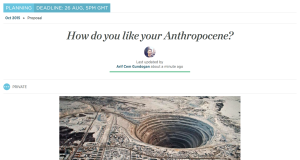 Thanks to my friends, colleagues and anonymous supporters, my proposal for the independent publishing platform Contributoria‘s October issue has reached the minimum target to be published just within the first 6 hours.
Thanks to my friends, colleagues and anonymous supporters, my proposal for the independent publishing platform Contributoria‘s October issue has reached the minimum target to be published just within the first 6 hours.
You can still support it from here.
My proposal is as follows, and you can still support it from here.
Scientists have been discussing the meaning of Anthropocene concept since first coined by Paul Crutzen in 2000. For many, the Anthropocene (a.k.a “the age of humans”) means human agency just became one of the forces of change on the planet which had been transformed solely with its own dynamics (and/or even acts of God, as you like). Some argued that we have reached to “the limits of our planet”. Therefore, things should be much different than it used to be in the previous period (which is Holocene).
Strikingly, it was not only physical scientist who have been focusing on this rapidly emerging concept, but there is also growing interest from the social scientists and environmental humanities scholars. Obviously, when different world views and perspectives look at the same point, they may come up completely different conclusions. This is may be why, we observe increasing number of opinion articles, editorials and growing interdisciplinary literature on the Anthropocene concept. Are we close to agreeing on a single definition? Should we be? What is Anthropocene for? Do we need it?This article intends to reveal different points of views and invite readers to join the discussion on the role of humans on planet Earth, which is becoming increasingly popular at the edge of unprecedented global environmental change.
The article is expected to be in 1500 words (max).
